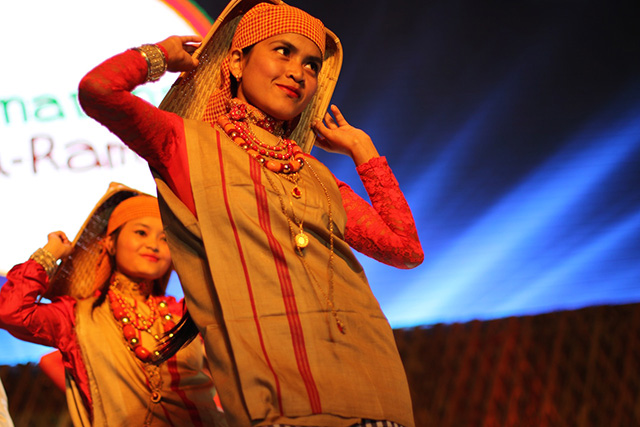
At an ancient sacred grove in Mawphlang, orchids bloomed on towering evergreen trees. Our guide picked a fallen rudraksha seed that is used as a prayer bead and medicine. Nestled in East Khasi Hills in the Indian state of Meghalaya, meaning the abode of the clouds, this sacred grove is a stunning example of how indigenous communities are guardians of their forests and territories. People are forbidden to disturb the grove or gather any forest resources to respectlabasa, the forest deity. We walk in quiet contemplation and awe through emerald hues of ferns and vines.
The walk in the sacred grove was part of Indigenous Terra Madre(ITM) that brought together 140 indigenous food communities from 58 countries in November. A collaboration of the Indigenous Partnership for Agrobiodiversity and Food Sovereignty, Slow Food International and North East Slow Food and Agrobiodiversity Society(NESFAS), ITM celebrated the rich food cultures of Indigenous Peoples and showcased their resilient food systems and sustainable practices.
“Indigenous Peoples have a lesson for all of us as we search for a way forward to overcome the crises we face today,” said Phrang Roy, founder of NESFAS and an advocate of indigenous food systems from the Khasi tribe in Meghalaya. “Today there is growing awareness that indigenous knowledge that had been ignored and marginalized as a primitive knowledge system is something we need to look to to build a sustainable, fairer system where food security, nutrition and well being of people is held together.”
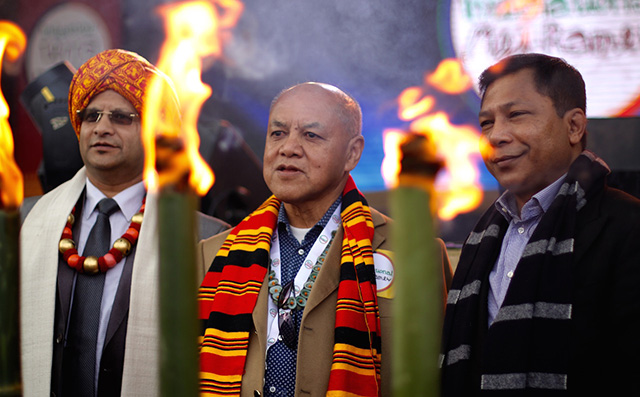 “We need to trust in our wisdom,” said Phrang Roy, Khasi Tribe, India (center in photo). “Today there is growing awareness that indigenous knowledge that had been ignored and marginalized as a primitive knowledge system is something we need to look to, to build a sustainable, fairer system where food security, nutrition and well being of people is held together.” (Photo: Rucha Chitnis)
“We need to trust in our wisdom,” said Phrang Roy, Khasi Tribe, India (center in photo). “Today there is growing awareness that indigenous knowledge that had been ignored and marginalized as a primitive knowledge system is something we need to look to, to build a sustainable, fairer system where food security, nutrition and well being of people is held together.” (Photo: Rucha Chitnis)
Indigenous Terra Madre spanned five days, where delegates dialogued at a conference, visited matrilineal Khasi communities on jaw-dropping mountainous vistas and tasted the stunning culinary diversity of their local foods—roots, greens, tubers, millets, chutneys and meats. “We are the people who care for the food and water, our Mother Earth. We are the people who care for our traditions, care for our future generations and our relatives whether they have wings, or fins or roots or paws,” said renowned Anishinaabe activist Winona LaDuke at the opening ceremony. LaDuke shared how Indigenous Peoples are part of a growing movement that is resisting the theft of native seeds and lands.
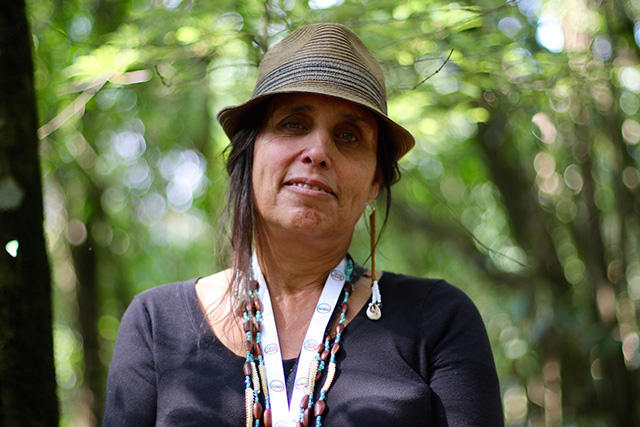 “Our food is pre-petroleum, pre-colonial. It is pre-genetic engineering. It is ancient food and ancient seeds,” said Winona LaDuke, Anishinaabekwe, United States. “We are part of a movement to stop the theft of our lands and seeds. Our communities know how to feed and live with the Earth, which is the opposite of industrial agriculture.” (Photo: Rucha Chitnis)
“Our food is pre-petroleum, pre-colonial. It is pre-genetic engineering. It is ancient food and ancient seeds,” said Winona LaDuke, Anishinaabekwe, United States. “We are part of a movement to stop the theft of our lands and seeds. Our communities know how to feed and live with the Earth, which is the opposite of industrial agriculture.” (Photo: Rucha Chitnis)
Tasting workshops showcased the breathtaking diversity of indigenous foods: fermented foods, wild edibles, wild rice, honey and a lively tasting session on insects that demonstrated how food sovereignty was deeply interlinked with environmental health and relationship with nature. The convening closed with the Mei-Ramew Food Festival, meaning Mother Earth in local Khasi language, at Mawphlang, where over 50,000 people across North East India and beyond joined the celebration of indigenous foods through food exhibition stalls, dances and songs from Khasi, Naga and Kuki tribes and a special performance by Mongolian throat singers.
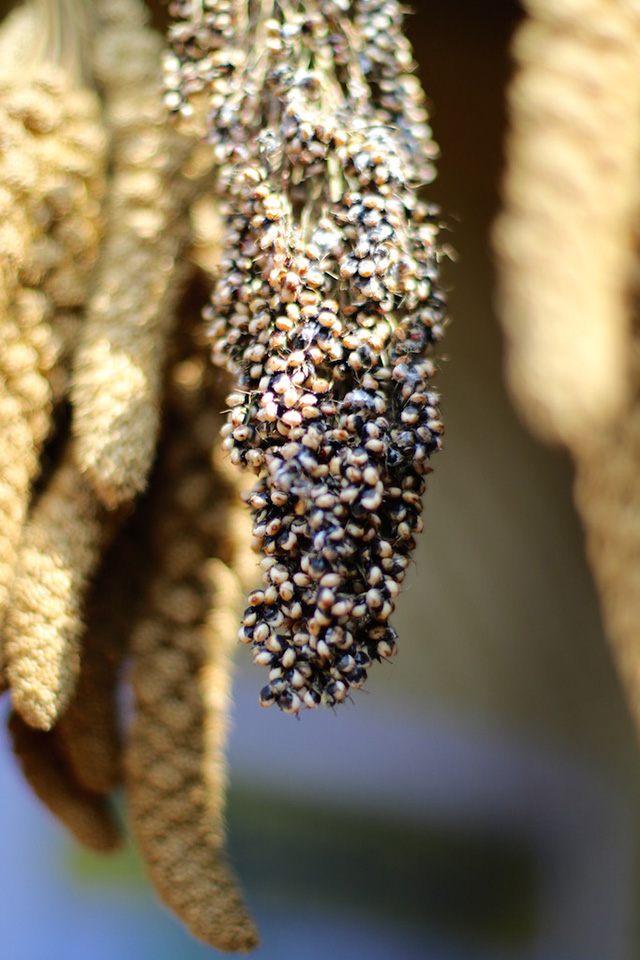 The Mei-Ramew Food Festival had a dazzling array of indigenous food stalls, where wild edible greens, roots, tubers, millets and corns exhibited their deliciousness and medicinal value. (Photo: Rucha Chitnis)
The Mei-Ramew Food Festival had a dazzling array of indigenous food stalls, where wild edible greens, roots, tubers, millets and corns exhibited their deliciousness and medicinal value. (Photo: Rucha Chitnis)
Dayamani Barla, tribal journalist, who is on the frontline of land grabbing struggles in Jharkhand, India, shared how indigenous culture and identity is inextricably tied to the health of their surrounding environment. “Our very culture and identity is tied with nature. We can’t survive when nature is being looted by the current economic paradigm. If we want to promote our food sovereignty, we have to stop the displacement of Indigenous Peoples from their traditional lands and territories. And we have to be rooted in resistance.”
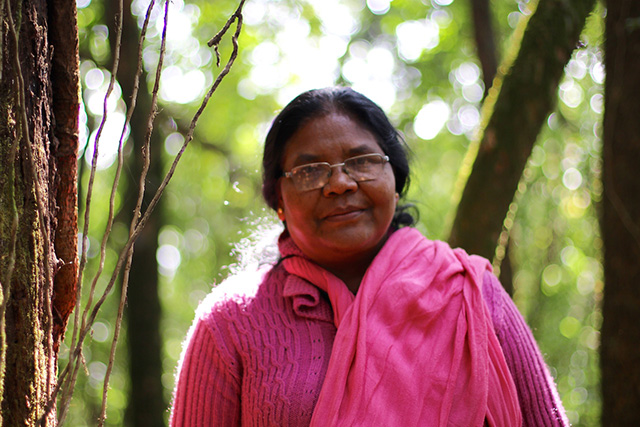 “Indigenous Peoples can’t imagine a future where nature is violated. We can’t realize food sovereignty when our lands, forests and waterways are being destroyed. If we want to sustain life on this planet, all people and social movements need to unite with the resistance of Indigenous Peoples,” said Dayamani Barla, Munda Tribe, India. (Photo: Rucha Chitnis)
“Indigenous Peoples can’t imagine a future where nature is violated. We can’t realize food sovereignty when our lands, forests and waterways are being destroyed. If we want to sustain life on this planet, all people and social movements need to unite with the resistance of Indigenous Peoples,” said Dayamani Barla, Munda Tribe, India. (Photo: Rucha Chitnis)
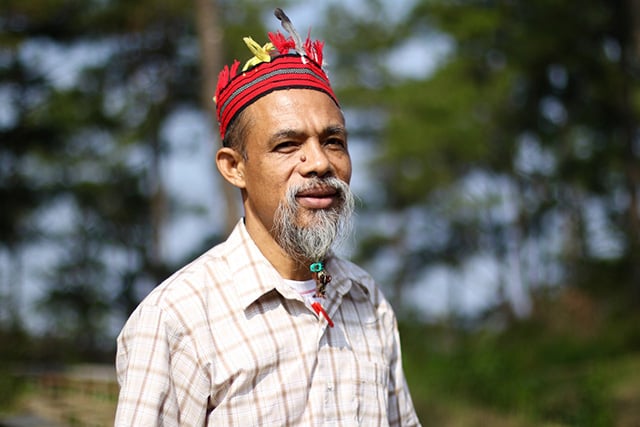 “Indigenous Peoples are threatened by extractive development, whether it is logging or mining by national or multinational corporations,” said Manuel Onalan, Kalinga Tribe, Philippines. “The future we want requires redefining the direction of the global economy. We need to redistribute resources and regenerate nature to create socially equitable communities.” (Photo: Rucha Chitnis)
“Indigenous Peoples are threatened by extractive development, whether it is logging or mining by national or multinational corporations,” said Manuel Onalan, Kalinga Tribe, Philippines. “The future we want requires redefining the direction of the global economy. We need to redistribute resources and regenerate nature to create socially equitable communities.” (Photo: Rucha Chitnis)
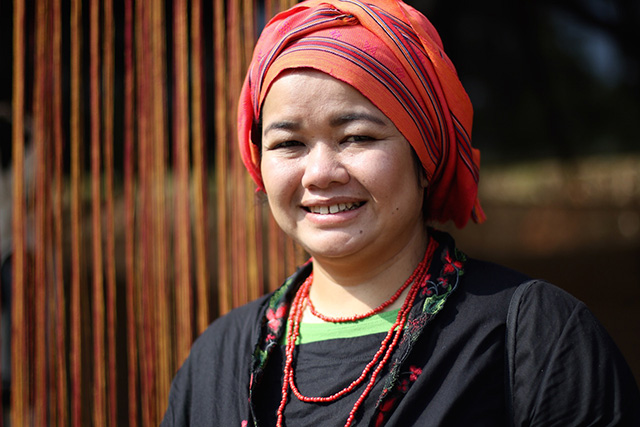 “We need to revive our traditional knowledge. Indonesia has a wealth of food biodiversity, traditional knowledge and indigenous wisdom,” said Helianti Hilman, Javanese, Indonesia. “The green revolution was driven by a monoculture paradigm and was disrespectful to local knowledge systems. There is a colonization of farmers, which impacts their food sovereignty. I believe in the power of consumers to respect their source of food and growers of food.” (Photo: Rucha Chitnis)
“We need to revive our traditional knowledge. Indonesia has a wealth of food biodiversity, traditional knowledge and indigenous wisdom,” said Helianti Hilman, Javanese, Indonesia. “The green revolution was driven by a monoculture paradigm and was disrespectful to local knowledge systems. There is a colonization of farmers, which impacts their food sovereignty. I believe in the power of consumers to respect their source of food and growers of food.” (Photo: Rucha Chitnis)
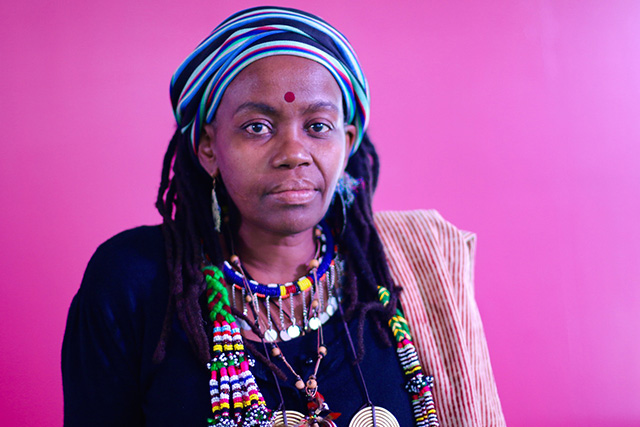 “The modern world is disconnected from nature,” said Wanjiku Mwangi, Kikuyu, Kenya. “The farmers need the bee. The pastoralists need the bee. We need to understand the whole cycle to understand the significance of the bees. We know we don’t want GMOs, and we need to have as much control as within, as without.” (Photo: Rucha Chitnis)
“The modern world is disconnected from nature,” said Wanjiku Mwangi, Kikuyu, Kenya. “The farmers need the bee. The pastoralists need the bee. We need to understand the whole cycle to understand the significance of the bees. We know we don’t want GMOs, and we need to have as much control as within, as without.” (Photo: Rucha Chitnis)
 “We cannot separate human existence from nature,” said Jimsi Tassar, Nyishi Tribe, Arunachal Pradesh, India. “We need to understand what is the right balance for growth and have a healthy relationship with our environment. Let’s acknowledge that we are part of the environment.” (Photo: Rucha Chitnis)
“We cannot separate human existence from nature,” said Jimsi Tassar, Nyishi Tribe, Arunachal Pradesh, India. “We need to understand what is the right balance for growth and have a healthy relationship with our environment. Let’s acknowledge that we are part of the environment.” (Photo: Rucha Chitnis)
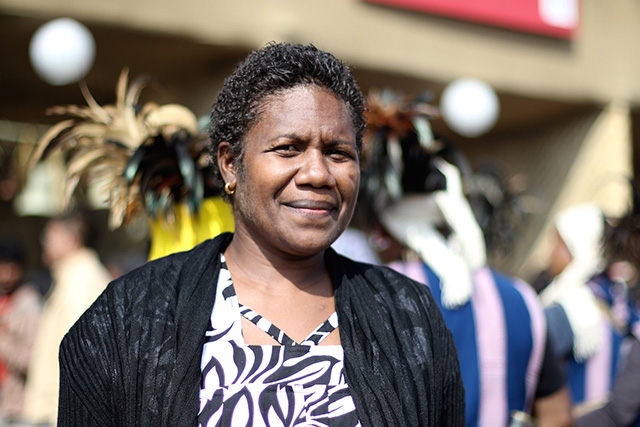 “My mother is a slow food champion and is my inspiration. Our traditional foods are disappearing, and my mother is working hard to revive it,” said Beverlin Mahana, Tanna Island, Vanuatu. “We are blessed with such beautiful vegetables; our soil is rich. Climate change is affecting us. In the future I want to work with communities to revive our traditional meals.” (Photo: Rucha Chitnis)
“My mother is a slow food champion and is my inspiration. Our traditional foods are disappearing, and my mother is working hard to revive it,” said Beverlin Mahana, Tanna Island, Vanuatu. “We are blessed with such beautiful vegetables; our soil is rich. Climate change is affecting us. In the future I want to work with communities to revive our traditional meals.” (Photo: Rucha Chitnis)
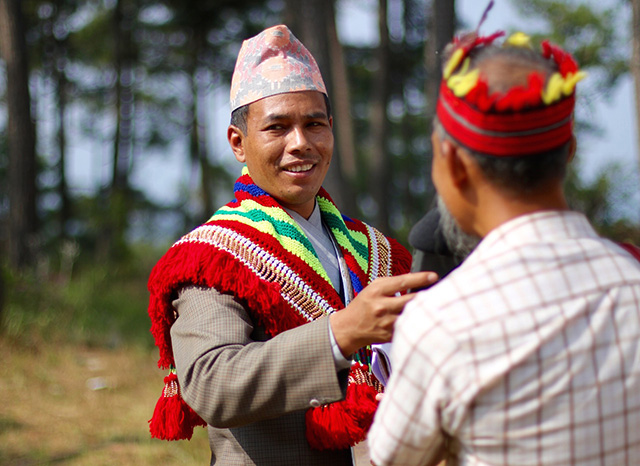 “The mainstream media ignores issues on indigenous rights,” said Dev Kumar Sunuwar, Koits-Sunuwar Tribe, Nepal. “There was a need for Indigenous Peoples to have their own media, in their own language to frame their own narratives. We founded the Indigenous Media Foundation and networked 17 indigenous community radios. Our plan is to now produce indigenous television programs, including cooking shows on our traditional foods.” (Photo: Rucha Chitnis)
“The mainstream media ignores issues on indigenous rights,” said Dev Kumar Sunuwar, Koits-Sunuwar Tribe, Nepal. “There was a need for Indigenous Peoples to have their own media, in their own language to frame their own narratives. We founded the Indigenous Media Foundation and networked 17 indigenous community radios. Our plan is to now produce indigenous television programs, including cooking shows on our traditional foods.” (Photo: Rucha Chitnis)
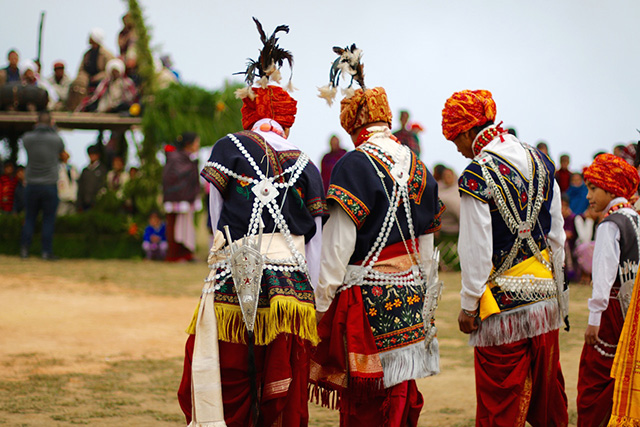 Nine indigenous communities hosted over 600 delegates from 58 countries on a day filled with agro-biodiversity walks, cultural performances and a delicious meal of locally sourced foods. (Photo: Rucha Chitnis)
Nine indigenous communities hosted over 600 delegates from 58 countries on a day filled with agro-biodiversity walks, cultural performances and a delicious meal of locally sourced foods. (Photo: Rucha Chitnis)
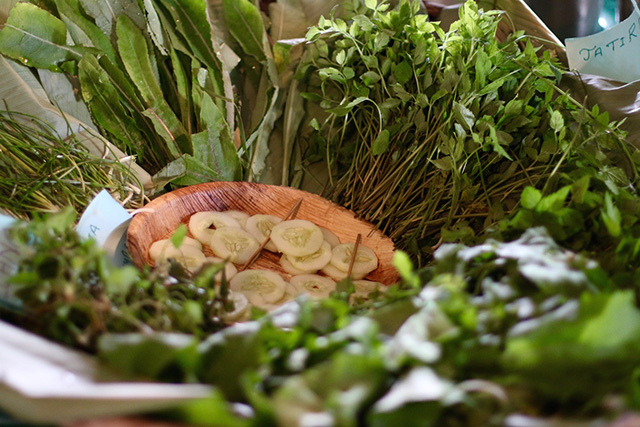 Site visits to nine indigenous communities included a generous spread of local cuisine and wild edible greens that were sourced from surrounding forests. (Photo: Rucha Chitnis)
Site visits to nine indigenous communities included a generous spread of local cuisine and wild edible greens that were sourced from surrounding forests. (Photo: Rucha Chitnis)
 Edgar Hinge, a master sand drawer from Vanuatu, regaled the audience with a wondrous storytelling session through sand drawing, a dynamic and rich tradition to share stories on rituals, mythological lore, cosmology and oral histories of indigenous communities. (Photo: Rucha Chitnis)
Edgar Hinge, a master sand drawer from Vanuatu, regaled the audience with a wondrous storytelling session through sand drawing, a dynamic and rich tradition to share stories on rituals, mythological lore, cosmology and oral histories of indigenous communities. (Photo: Rucha Chitnis)
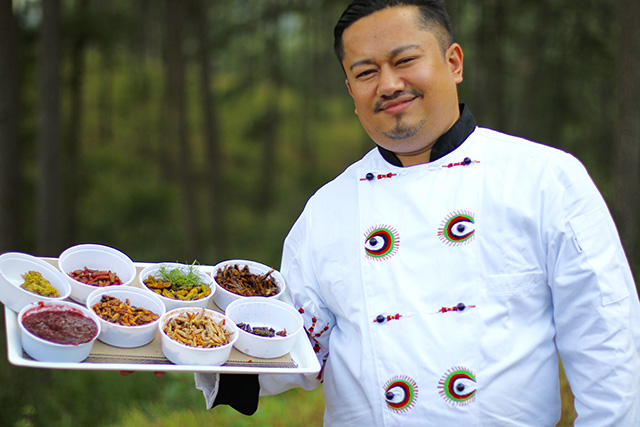 Chef Joel Basumatari, Sema-Angami and Kachari Tribes of Nagaland, India, shared his passion to train indigenous youth to respect their unique food culture. “Old is gold,” he said. Basumatari served a dazzling platter of insects with sweet potato and bamboo shoots at a tasting workshop. Delegates had crunchy grasshoppers, edible spiders, honeybees and carpenter worm, considered the saffron of worms. “Insects are full of protein. You can add carpenter worm to your salad and make a healthy meal,” he said. (Photo: Rucha Chitnis)
Chef Joel Basumatari, Sema-Angami and Kachari Tribes of Nagaland, India, shared his passion to train indigenous youth to respect their unique food culture. “Old is gold,” he said. Basumatari served a dazzling platter of insects with sweet potato and bamboo shoots at a tasting workshop. Delegates had crunchy grasshoppers, edible spiders, honeybees and carpenter worm, considered the saffron of worms. “Insects are full of protein. You can add carpenter worm to your salad and make a healthy meal,” he said. (Photo: Rucha Chitnis)
Join us in defending the truth before it’s too late
The future of independent journalism is uncertain, and the consequences of losing it are too grave to ignore. To ensure Truthout remains safe, strong, and free, we need to raise $46,000 in the next 7 days. Every dollar raised goes directly toward the costs of producing news you can trust.
Please give what you can — because by supporting us with a tax-deductible donation, you’re not just preserving a source of news, you’re helping to safeguard what’s left of our democracy.